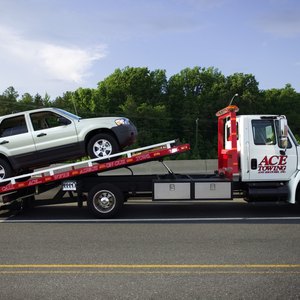
Towing companies often must perform their duties in the absence of a vehicle owner. The company has no way of knowing in advance if the owner will pay for the recovery of the vehicle. Without legal protection, towing companies could be left uncompensated for their expenses. To allow towing companies to recoup their costs, laws were enacted to give these companies the right to a lien on towed vehicles.
Right to Lien
Towing companies must move, store and reasonably protect the vehicles they tow, requiring significant expenditure of labor, time and space. Towing companies are often bound by a contract with a law enforcement agency or city. Under the terms of the contract, the companies are obliged to move vehicles when requested, whether or not payment for these services is forthcoming. To protect towing companies from taking a loss on unclaimed vehicles, city laws often grant them a legal right to a lien on every vehicle they tow. This means that if the vehicle's owner does not or cannot pay towing and storage expenses in a timely manner, the towing company may sell the vehicle to pay for services rendered.
Foreclosing on Lien
For a towing company to foreclose on a lien typically requires filing a suit with the city's courts. A successful suit will require the towing company to show sufficient evidence of attempts to contact the registered vehicle owner and to collect payment. Guidelines of reasonable attempts for contact and collection vary by state; in New Mexico, for example, towing companies have five days to locate the vehicle's registration information and two days to send confirmation by certified mail to the owner to verify the vehicle's ownership. Towing companies that fail to identify or contact vehicle owners within these time frames are not allowed to foreclose on a lien.
Auctions
In some states, towing companies may take action to sell a towed vehicle without going through the court. Generally, it requires either the towing company or the county sheriff's office to hold the vehicle for 10 to 14 days while they identify and contact the vehicle owner or lien holder. Contact is made through certified mail with a notice of the debt and 10 days to pay it. If no payment is made within that 10-day period, then the towing company must notify the county sheriff and state police and may begin advertising the sale of the vehicle. In New Mexico, the vehicle must be advertised for a minimum of 20 days before the sale. Once the vehicle goes to auction, it is sold to the highest cash bidder and the proceeds are put towards the lien, costs of storage and labor, and any fees accrued. State laws vary, but in Illinois, the amount recovered by a lien is not permitted to exceed $2,000.
Personal Property
If towing fees are not paid, then the personal property within the vehicle at the time of the tow may be subject to the lien as well. In New Mexico, vehicle owners may remove personal belongings from a towed vehicle during business hours, unless the vehicle has been ordered to be held for investigation by law enforcement. In Illinois, personal property in the car is subject to a lien, with exceptions made for items like food, eyeglasses, child restraints, medication, cash or credit cards and identifying documents. Property in the vehicle belonging to someone besides the owner may be claimed if sufficient proof of ownership is presented to the towing company. In instances where a vehicle is towed as a result of an accident, some states allow the vehicle owner to claim all personal property in the vehicle if proof of insurance that covers towing and storage fees of the vehicle is given to the company.
Disposition of Proceeds
Although state laws vary somewhat, the disposition of the proceeds from the sale of a towed vehicle generally follow a set order. Any costs incurred that relate directly to the sale, such as advertising, are paid first. The towing company then receives what it is due for towing and storing the vehicle. If a financial organization has a lien on the car, it is paid next.
References
Writer Bio
Jeffrey Joyner has had numerous articles published on the Internet covering a wide range of topics. He studied electrical engineering after a tour of duty in the military, then became a freelance computer programmer for several years before settling on a career as a writer.

